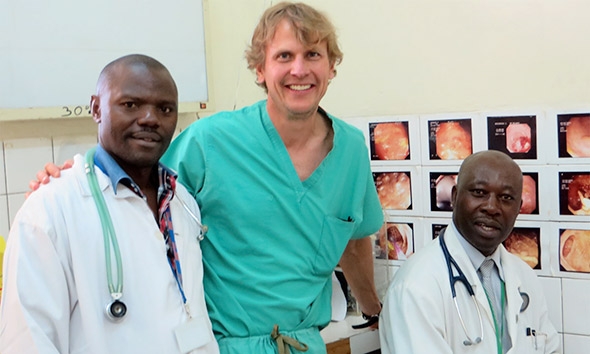Read the full story by Susan Green, published by the Geisel School of Medicine.

When Steve Bensen, Geisel ’90, talks about the two months he spent in Rwanda earlier this year, you can hear the optimism in his voice. Exhilarated by his first foray into global health, he wants to help others have a similar experience.
Bensen, an associate professor of medicine at Dartmouth’s Geisel School of Medicine and a physician at Dartmouth-Hitchcock Medical Center who specializes in gastroenterology and hematology, is the first gastroenterologist to participate in the Human Resources for Health (HRH) program. A seven-year partnership between the Rwandan Ministry of Health, the Clinton Foundation, and several U.S. medical schools, including Geisel, HRH is committed to rebuilding the medical education and health-care systems in Rwanda.
“I tried for a number of years to do something like this and investigated different avenues,” Bensen says. “But it’s difficult for a gastroenterologist because we are dependent on technology when offering our skills.”
Although there is significant gastrointestinal (GI) disease in Rwanda, physicians lack both the equipment and training to provide specialized care. Armed with hundreds of donated endoscopic devices—biopsy forceps, snares, balloon dilators, PEG (feeding devices) kits, and esophageal band ligators—Bensen’s goals were to teach physicians, residents, and interns to perform simple GI procedures and to show hospital managers the importance of providing these devices. “There’s an amazing amount of good to be done with fairly simple instruments,” he says.
